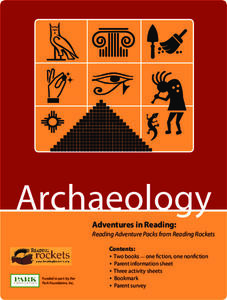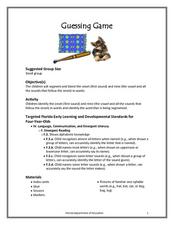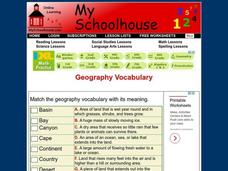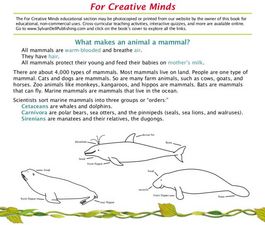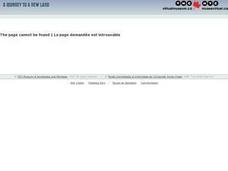American Museum of Natural History
What is Marine Biology?
A marine environment covers the majority of the earth but is arguably the least understood. Teach young scientists about the characteristics of oceans and ocean species using an interactive online lesson. The in-person or remote learning...
Curated OER
Environment: Clouds of Changing Times
Here is a wonderful lesson which has youngsters interview family and local elders about the seasonal history of their local area. They focus on climate change by asking questions about rainfall, temperatures, length of the seasons, and...
American Museum of Natural History
Race to the South Pole
Antarctica was the last continent humans explored. Explore how two teams raced to be the first using an interactive online lesson. Users learn about the climate challenges and how the teams sought to overcome them. The resource is...
PBS
Reading Adventure Pack: Archaeology
Readings of fiction and nonfiction texts followed by a series of activities put scholars in an archaeologist's shoes. Learners read two texts, Archaeologists Dig for Clues by Kate Duke and The Shipwrecked Sailor: An Egyptian Tale with...
Curated OER
Food Webs
Students create a bulletin board display illustrating food chains they make from a list of ocean organisms. Students also play a game showing what happens when one of the organisms is removed from the food chain and how they are all...
Curated OER
Guessing Game
Learners participate in a set of activities designed to help ESL students become familiar with the English language through description, group work, oral reading, and question/answer sessions.
Curated OER
Exploiting Antarctica
Learners read the story and diary "Lizzie's diaries from Antarctica and Antarctica" to get massive clean-up. Students discuss their knowledge of life in Antarctica and raise the fact of the Amundsen-Scott South Pole Station and its...
Curated OER
Tide Pool Discovery
First graders visit the Discovery Pool, where they use their senses to investigate the different tide pool species. They touch different species. Students describe how each one feels, and what they look like in words. They draw the...
Curated OER
Our Earth Crossword Puzzle
In this earth's environment worksheet, students use the 20 clues and their problem solving skills to correctly complete the crossword puzzle.
Curated OER
Whale Is Stuck
Learners engage in the process of problem solving with the help of children's literature story of how the whale was trapped and then freed. The story illustrates the power of teamwork and commitment. The students practice the skill of...
Curated OER
Physiological Adaptations
Young scholars investigate the concepts of genetics and how it is tied to the variations found within different species and how it is tied to adaptations. They review the theory of evolution and factors found to help create variation....
Curated OER
Geography Vocabulary
For this identifying geographic terms and their definitions online interactive worksheet, learners match the vocabulary words with their definitions. Students match 24 answers.
Arizona Geographic Alliance
Geography of Ancient Greece
In this geography skills worksheet, students read a selection about the geography of ancient Greece and then respond to 6 essay, short answer, and graphic organizer questions based on the selection.
Curated OER
Sprinkles 5
For this environment worksheet, students read the information and complete the survey about their own local habitats and some of the others in Florida.
Curated OER
Shark Food
Students create a linking chain to demonstrate the food chain. In this food chain lesson, students use the Internet to research sharks, including what they eat, and create a chain link with a picture of a shark. They continue...
Curated OER
Fossil Lab
In this fossil activity, students are given fossils and an identification key. They write their scientific names and common names. They also answer questions about fossils.
Curated OER
Oklahoma Grown: Discovering Oklahoma's Agriculture
Fourth graders investigate where Oklahoma's variety of crops are harvested, and grown their own plants. A printable map and crop information guide are provided.
Curated OER
Aquatic Ecosystems
Students study the diversity of marine life and their habitats. In this aquatic ecosystems activity students complete a lab activity and experiment.
Curated OER
Back to the Farm
Students complete a family tree. In this farming and ranching lesson, students define the term genealogy, learn how to create a family tree, and fill in a family tree with the help of their parents making sure to note if any of...
Curated OER
For Creative Minds: What Makes an Animal a Mammal?
Students read about categories of mammals and their features. Students then construct a marine animal, using given print outs in the lesson. Students then create adaptations for their mammal, using a web site reference for guidance.
Curated OER
Ice Age Challenge Game
Students use a website to do various projects about the ice age and discover the route taken by the first arrivals are unknown and are the subject of a great deal of debate and research.
Curated OER
Cradles of Civilization Information Sheet
In this early civilizations worksheet, students read 4 paragraphs about great river civilizations and then label them Nile, Tigris and Euphrates, Indus, and the Huang He River Civilizations. Student also complete a writing prompt on the...
Curated OER
WONDERFUL, WATERFUL WETLANDS
Students list characteristics of wetland and describe the functions of a wetland.
Curated OER
Camouflage, Protection, & Adaptations—Who am I?
Students explore ocean animal adaptations. In this animal adaptations lesson, students examine how different ocean animals use adaptations other than camouflage to protect themselves.





